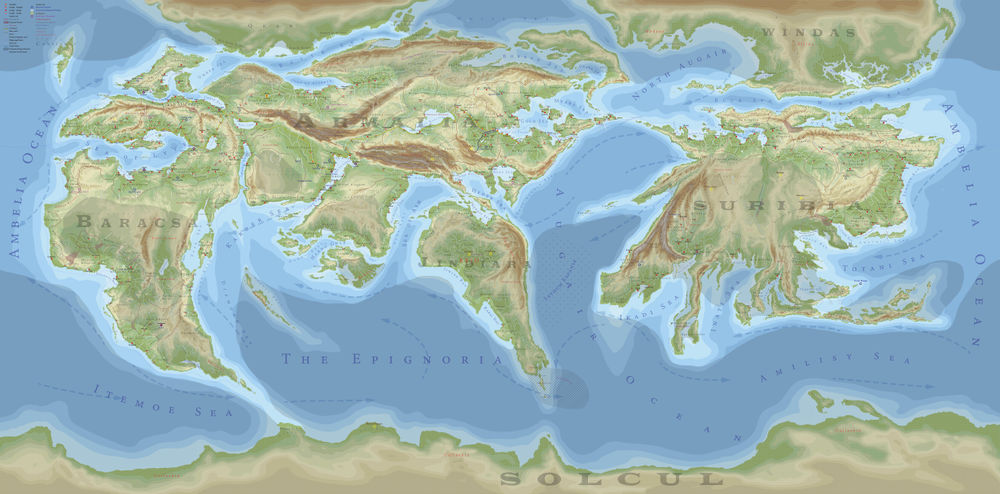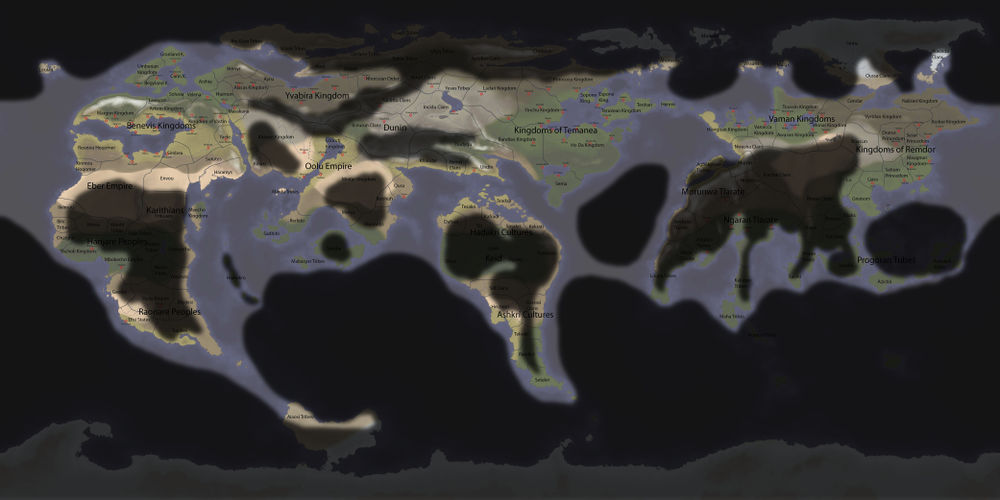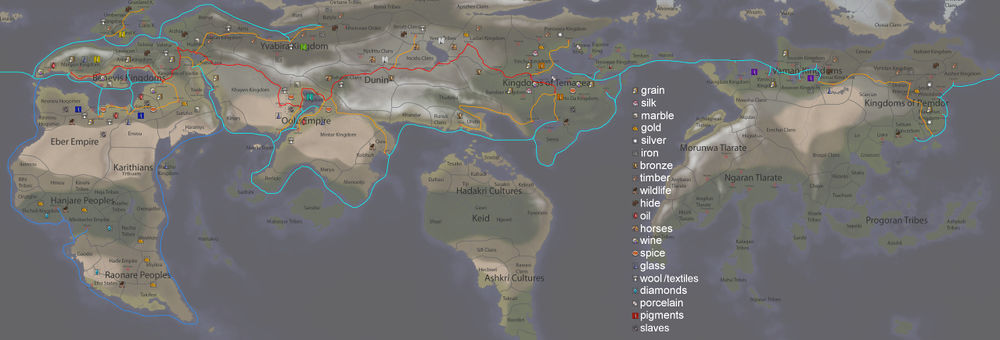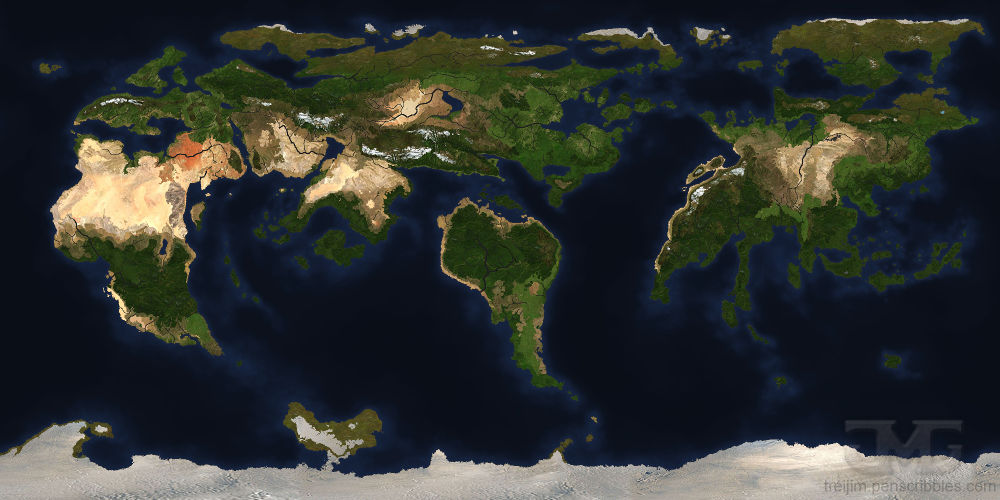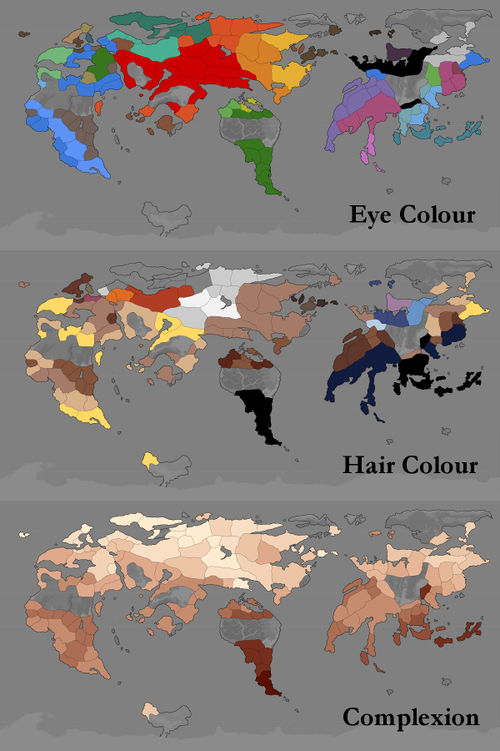World Maps: Difference between revisions
From Riiga
Jump to navigationJump to search
No edit summary |
No edit summary |
||
| (15 intermediate revisions by the same user not shown) | |||
| Line 1: | Line 1: | ||
[[File:riigabiomes.jpg| | [[File:riigabiomes.jpg|800px|thumb|A biome map of Riiga.]] | ||
An article by Virgil on [[Benevis Mapping]]. | |||
==Realistic Biomes== | ==Realistic Biomes== | ||
* '''Polar/Ice''' - Freezing cold land covered primarily in packed ice which sees little sunlight. | * '''Polar/Ice''' - Freezing cold land covered primarily in packed ice which sees little sunlight. | ||
| Line 11: | Line 14: | ||
* '''Wooded Savanna''' - Savanna filled with low-density trees that do not create a canopy. | * '''Wooded Savanna''' - Savanna filled with low-density trees that do not create a canopy. | ||
* '''Subtropical Forest''' - Forest that sees high precipitation, warm weather, and humidity, with a distinct canopy. | * '''Subtropical Forest''' - Forest that sees high precipitation, warm weather, and humidity, with a distinct canopy. | ||
* '''Subtropical Rainforest''' - Tall forests that see regular rainfall but experience a short dry season, with a multi-layered canopy and rich soils. | |||
* '''Subtropical Rainforest''' - Tall forests that see regular rainfall but experience a short dry season, with a multi-layered canopy and rich soils. | * '''Monsoonal Forest''' - Deciduous forest that experiences a long dry season followed by a season of extreme rainfall. | ||
* '''Tropical Rainforest''' - Tall, lush rainforests that see heavy continuous rainfal and no dry season, with several distinct canopies and poor soil quality. | * '''Tropical Rainforest''' - Tall, lush rainforests that see heavy continuous rainfal and no dry season, with several distinct canopies and poor soil quality. | ||
* '''Mediterranean''' - Land with cool and wet winters and dry summers, with most rainfall falling during winter and a lot of sunlight. | * '''Mediterranean''' - Land with cool and wet winters and dry summers, with most rainfall falling during winter and a lot of sunlight. | ||
| Line 25: | Line 28: | ||
* '''Blightlands''' - Tropical forested land filled with poisonous plants and animals due to the natural toxic blight bursts that occur there. | * '''Blightlands''' - Tropical forested land filled with poisonous plants and animals due to the natural toxic blight bursts that occur there. | ||
* '''Burning Rainlands''' - A barren, toxic region that experiences rain that slowly dissolves organic material. | * '''Burning Rainlands''' - A barren, toxic region that experiences rain that slowly dissolves organic material. | ||
* '''Blue Night''' - A temperate, humid region which sees heavy blue-tinted seasonal fog, shrouding the land in darkness. | * '''Blue Forest/Night''' - A temperate, humid region which sees heavy blue-tinted seasonal fog, shrouding the land in darkness. | ||
[[File: | [[File:Geopoliticalriiga.jpg|1000px|thumb|A geopolitical map of Riiga coloured by altitude. The key is in the upper left corner. ]] | ||
Each city marked represents a population of 10,000,000 both within it and in the surrounding area. | Each city marked represents a population of 10,000,000 both within it and in the surrounding area. | ||
| Line 39: | Line 40: | ||
[[File:riigatrade.jpg|1000px|thumb|A map of major trade routes in among the connected Riigan cultures. Red: The Archroad. Orange: Archroad connections. Aqua: The main sea trading routes. Blue: The Diamond Route. Goods shown are only of major sources.]] | [[File:riigatrade.jpg|1000px|thumb|A map of major trade routes in among the connected Riigan cultures. Red: The Archroad. Orange: Archroad connections. Aqua: The main sea trading routes. Blue: The Diamond Route. Goods shown are only of major sources.]] | ||
[[File:monsterzones.jpg|1000px|thumb|A map of current and historical sites of heavy [[monster]] or monster-race activity.]] | [[File:monsterzones.jpg|1000px|thumb|A map of current and historical sites of heavy [[Monsters|monster]] or monster-race activity.]] | ||
[[File:texturedmap.jpg|1000px|thumb|A textured map of Riiga designed to look like satellite imagery.]] | |||
[[File:racesriiga.jpg|500px|thumb|A map showing dominant eye, hair, and skin colour as per the borders on the political map.]] | |||
Revision as of 11:27, 30 January 2021
An article by Virgil on Benevis Mapping.
Realistic Biomes
- Polar/Ice - Freezing cold land covered primarily in packed ice which sees little sunlight.
- Tundra - A cold, barren land with frozen soil, almost no trees, and short growing seasons allowing only grasses, shrubs, and mosses.
- Taiga - Cold forests mostly containing evergreen conifers, with very short summers and cold, snowy winters.
- Alpine Tundra - A high-altitude, treeless, freezing area with thin air which may be covered in snow throughout the whole year.
- Montane Forest - High-elevation deciduous forest lands that may be cool or warm depending on their place in the world.
- Temperate Forest - Forests mostly made of deciduous trees that see distinct warm summers and cool winters.
- Temperate Grassland - Grassland which sees freezing winters and hot summers, tough grasses, and low rainfall.
- Savanna - Grassland which experiences heavy rainfall in one season, but is otherwise quite dry and warm.
- Wooded Savanna - Savanna filled with low-density trees that do not create a canopy.
- Subtropical Forest - Forest that sees high precipitation, warm weather, and humidity, with a distinct canopy.
- Subtropical Rainforest - Tall forests that see regular rainfall but experience a short dry season, with a multi-layered canopy and rich soils.
- Monsoonal Forest - Deciduous forest that experiences a long dry season followed by a season of extreme rainfall.
- Tropical Rainforest - Tall, lush rainforests that see heavy continuous rainfal and no dry season, with several distinct canopies and poor soil quality.
- Mediterranean - Land with cool and wet winters and dry summers, with most rainfall falling during winter and a lot of sunlight.
- Dry Grassland - Cool grassy lands with low-growing vegetation and patchy coverage, perfect for grazing animals.
- Semiarid Desert - A desert with less sand dunes and more barren rocky ground that sees a wide range of temperatures.
- Arid Shrubland - Land with very little rainfall covered mostly in sparse shrubs and stones rather than sand dunes.
- Arid Desert - A very cold or very hot barren, dusty land with almost no precipitation, hostile toward most flora and fauna.
Riigan Biomes
- Glass Mountains - Due to mountains made of shimmering stone, glass mountain regions suffer from no vegetation whatsoever thanks to the storms of glass grains.
- Hills of Burden - A region in the Pearl Mountains which are really difficult to climb, causing them to be mostly void of trees and wildlife.
- Blightlands - Tropical forested land filled with poisonous plants and animals due to the natural toxic blight bursts that occur there.
- Burning Rainlands - A barren, toxic region that experiences rain that slowly dissolves organic material.
- Blue Forest/Night - A temperate, humid region which sees heavy blue-tinted seasonal fog, shrouding the land in darkness.
Each city marked represents a population of 10,000,000 both within it and in the surrounding area.
It also shows known Archaios locations, and man-made Wonders of certain (blue) or uncertain (white) locations.]]
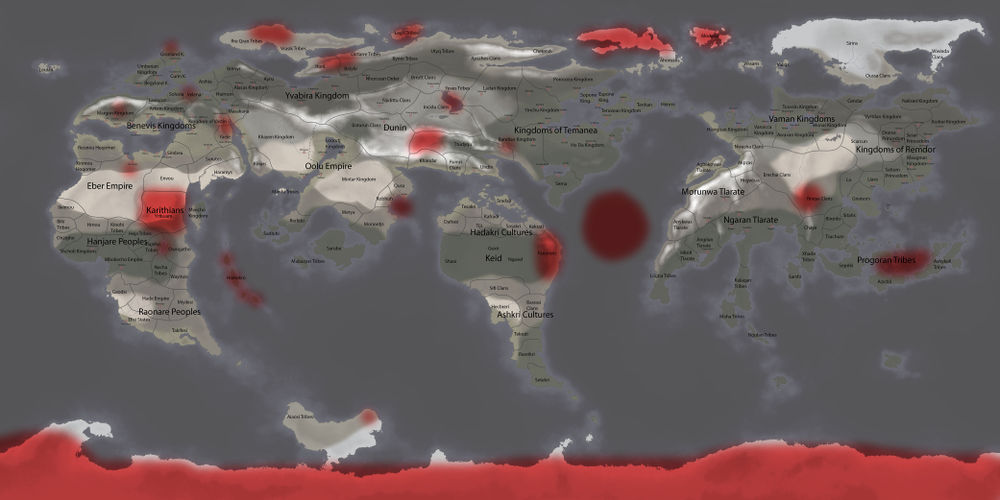
A map of current and historical sites of heavy monster or monster-race activity.

